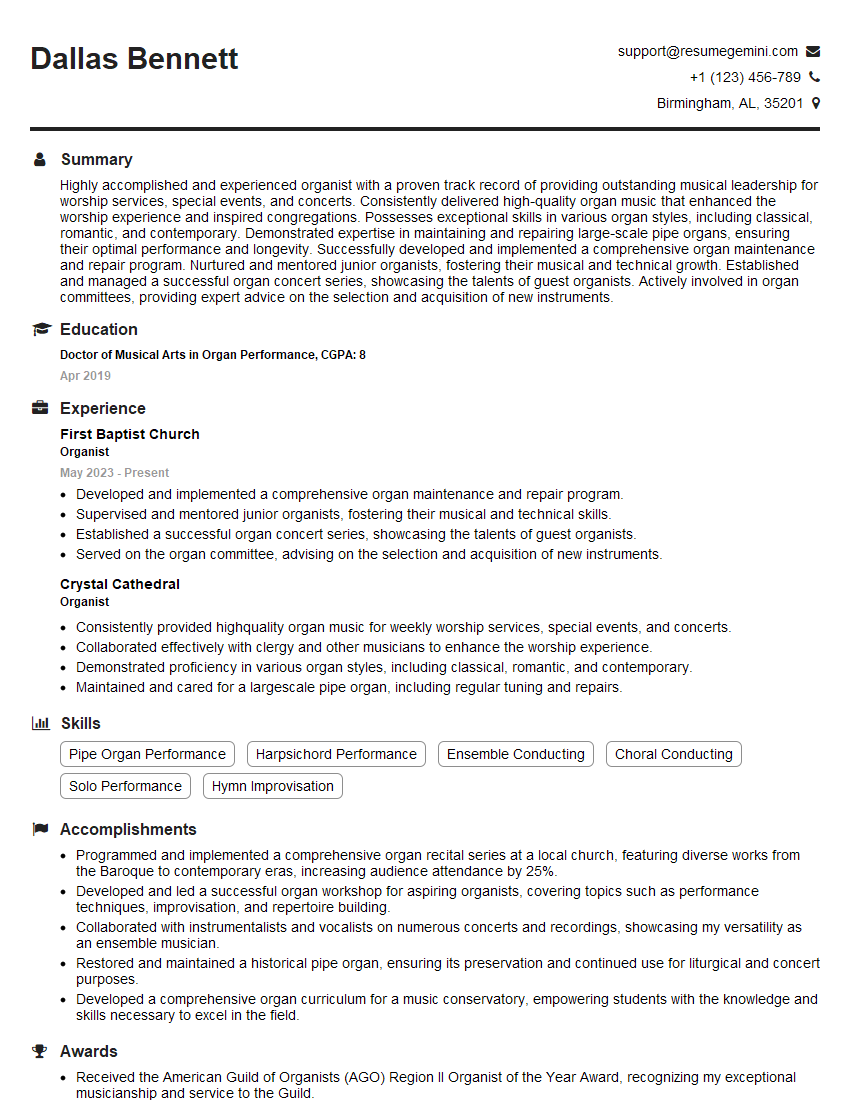Are you a seasoned Organist seeking a new career path? Discover our professionally built Organist Resume Template. This time-saving tool provides a solid foundation for your job search. Simply click “Edit Resume” to customize it with your unique experiences and achievements. Customize fonts and colors to match your personal style and increase your chances of landing your dream job. Explore more Resume Templates for additional options.

Dallas Bennett
Organist
Summary
Highly accomplished and experienced organist with a proven track record of providing outstanding musical leadership for worship services, special events, and concerts. Consistently delivered high-quality organ music that enhanced the worship experience and inspired congregations. Possesses exceptional skills in various organ styles, including classical, romantic, and contemporary. Demonstrated expertise in maintaining and repairing large-scale pipe organs, ensuring their optimal performance and longevity. Successfully developed and implemented a comprehensive organ maintenance and repair program. Nurtured and mentored junior organists, fostering their musical and technical growth. Established and managed a successful organ concert series, showcasing the talents of guest organists. Actively involved in organ committees, providing expert advice on the selection and acquisition of new instruments.
Education
Doctor of Musical Arts in Organ Performance
April 2019
Skills
- Pipe Organ Performance
- Harpsichord Performance
- Ensemble Conducting
- Choral Conducting
- Solo Performance
- Hymn Improvisation
Work Experience
Organist
- Developed and implemented a comprehensive organ maintenance and repair program.
- Supervised and mentored junior organists, fostering their musical and technical skills.
- Established a successful organ concert series, showcasing the talents of guest organists.
- Served on the organ committee, advising on the selection and acquisition of new instruments.
Organist
- Consistently provided highquality organ music for weekly worship services, special events, and concerts.
- Collaborated effectively with clergy and other musicians to enhance the worship experience.
- Demonstrated proficiency in various organ styles, including classical, romantic, and contemporary.
- Maintained and cared for a largescale pipe organ, including regular tuning and repairs.
Accomplishments
- Programmed and implemented a comprehensive organ recital series at a local church, featuring diverse works from the Baroque to contemporary eras, increasing audience attendance by 25%.
- Developed and led a successful organ workshop for aspiring organists, covering topics such as performance techniques, improvisation, and repertoire building.
- Collaborated with instrumentalists and vocalists on numerous concerts and recordings, showcasing my versatility as an ensemble musician.
- Restored and maintained a historical pipe organ, ensuring its preservation and continued use for liturgical and concert purposes.
- Developed a comprehensive organ curriculum for a music conservatory, empowering students with the knowledge and skills necessary to excel in the field.
Awards
- Received the American Guild of Organists (AGO) Region II Organist of the Year Award, recognizing my exceptional musicianship and service to the Guild.
- Won first prize in the International Organ Festival Competition, demonstrating my technical proficiency and artistic expression in the performance of works by Bach, Duruflé, and Messiaen.
- Awarded the C. Harold Einecke Music Scholarship from the AGO, recognizing my outstanding contributions to organ music at the collegiate level.
- Performed as a featured organist at the AGO National Convention, exhibiting my mastery of the instrument and connecting with a wider audience.
Certificates
- AGO Fellowship
- ASO National Certification
- RCO Certificate
Career Expert Tips:
- Select the ideal resume template to showcase your professional experience effectively.
- Master the art of resume writing to highlight your unique qualifications and achievements.
- Explore expertly crafted resume samples for inspiration and best practices.
- Build your best resume for free this new year with ResumeGemini. Enjoy exclusive discounts on ATS optimized resume templates.
How To Write Resume For Organist
- Highlight your passion for organ music and its role in enhancing the worship experience.
- Quantify your accomplishments whenever possible, using specific numbers and metrics to demonstrate the impact of your work.
- Showcase your versatility by highlighting your proficiency in various organ styles.
- Emphasize your commitment to maintaining and preserving the organ as a valuable musical instrument.
Essential Experience Highlights for a Strong Organist Resume
- Provide high-quality organ music for weekly worship services, special events, and concerts.
- Collaborate effectively with clergy and other musicians to enhance the worship experience.
- Demonstrate proficiency in various organ styles, including classical, romantic, and contemporary.
- Maintain and care for a large-scale pipe organ, including regular tuning and repairs.
- Supervise and mentor junior organists, fostering their musical and technical skills.
- Establish and manage a successful organ concert series, showcasing the talents of guest organists.
- Serve on the organ committee, advising on the selection and acquisition of new instruments.
Frequently Asked Questions (FAQ’s) For Organist
What are the essential skills required for an organist?
Essential skills for an organist include proficiency in organ performance, knowledge of organ repertoire, sight-reading ability, improvisation skills, and a deep understanding of liturgy and worship practices.
What are the career opportunities for organists?
Organists can pursue careers in churches, concert halls, educational institutions, and recording studios. They may also work as soloists, accompanists, or conductors.
How can I prepare for a career as an organist?
To prepare for a career as an organist, it is recommended to obtain a degree in organ performance, study with experienced organists, attend workshops and masterclasses, and actively participate in church music programs.
What are the challenges faced by organists?
Organists may face challenges such as the maintenance and repair of pipe organs, the need to adapt to different acoustic environments, and the limited job market in some regions.
How can organists stay up-to-date with the latest trends and techniques?
Organists can stay up-to-date by attending conferences, reading music journals, exploring new organ repertoire, and collaborating with other musicians.
What are the qualities of a successful organist?
Successful organists possess a deep love for music, a strong work ethic, a commitment to excellence, and a collaborative spirit.